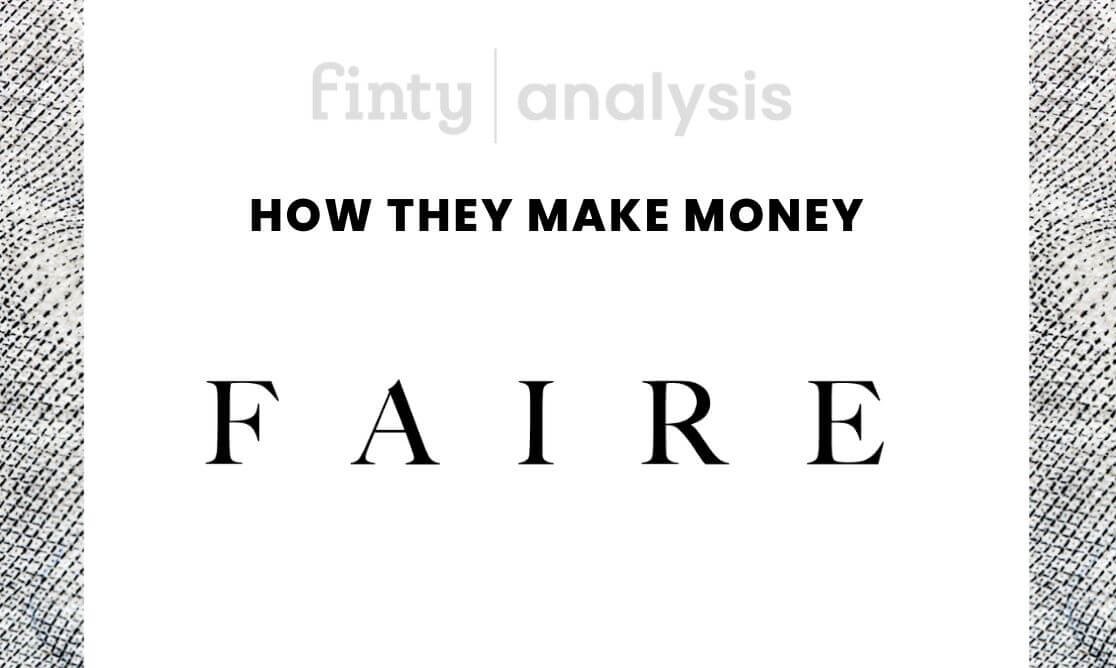Faire is an innovative wholesale marketplace that has been steadily gaining popularity in recent years. Faire stands out from the crowd in ways that aren't immediately apparent, often prompting the question: how exactly does Faire generate its revenue?
If you're eager to unravel the mystery behind Faire's business charm and money-making maneuvers, your journey starts right here.

Coming up next
What does Faire do?
Faire connects small stores with brands on an online platform where stores can find things to sell and brands can showcase their products to more people.
Launched in 2017, Faire has grown a lot and focuses on helping small stores get a variety of products to choose from while offering good payment terms.
Faire acts as a link between small stores and brands. Stores can easily pick products to sell, and brands get a bigger audience for their creations. Faire makes things smoother by letting stores pay later and return items hassle-free, which benefits both stores and brands.
How does Faire work?
In its essence, Faire functions as a bridge between small retailers and independent brands. Retailers can access Faire's platform and discover a plethora of products to stock their shelves. Meanwhile, independent brands can showcase their products to a wider audience, increasing their chances of attracting potential customers.
Faire aims to make the wholesale buying process more convenient for both parties by offering net payment terms and hassle-free returns. With Faire, retailers can place their orders at wholesale prices and enjoy the benefits of curated selections, while brands can reach a broader market and maintain their focus on crafting high-quality products.
How Faire makes money
Faire makes money through multiple channels, including taking a commission on each sale made through its platform, as well as charging subscription fees to certain retailers.
The various ways Faire generates revenue can be summarized as follows.
Commission on sales
Faire's main way of earning money is by taking a portion of each sale that happens on its platform. Imagine Faire as a bridge between small shops and brands. When a sale happens, Faire gets a small piece of the payment for making that connection possible.
So when small stores find cool things from independent brands on Faire and people buy those things, Faire gets a little bit of money from each sale. This way, Faire helps both the stores and the brands, and also keeps itself running smoothly. It's like a small fee for the service they provide in bringing everyone together in one place.
Subscription fees
Aside from earning a commission on each sale, Faire presents a subscription plan known as "Insider." This plan offer extra perks to retailers, including reduced commission rates and exclusive access to certain brands.
Most US retailers (except those in Alaska and Hawaii) can easily join Insider by clicking the dedicated button on their homepage. Retailers can kick-start their experience with a 30-day free trial upon joining. Following the trial, an Insider membership can be obtained for $19.99 per month.
Future growth engine
Looking ahead, Faire is poised for substantial growth in the wholesale industry. Its adeptness in providing essential solutions for retailers and fostering innovation positions it to achieve even greater expansion. Extending its assistance to stores and brands in untapped markets could elevate Faire's significance within the wholesale sector.
Faire could establish a presence in more locations where stores and brands operate, facilitating their connections. Furthermore, if Faire introduces fresh and innovative strategies to aid stores and brands, it could ascend as a preeminent wholesale platform. Through continuous innovation and attentiveness to the needs of stores and brands, Faire could establish itself as the optimal choice for all wholesale participants.
Risks
Just like any business, Faire encounters certain challenges and risks that could impact its operations and growth. These risks are important to consider because they can affect how Faire continues to operate and provide its services. Here are some of the key business risks that Faire navigates:
- Economic uncertainty. Changes in the economy can affect how much people buy, which might impact Faire's sales. Economic downturns or uncertainties could lead to lower demand from retailers, potentially affecting Faire's revenue.
- Dependence on Brands. Faire relies on independent brands to provide products for retailers. If Faire's relationship with these brands sours or if brands leave the platform, it could reduce the variety of products available and impact Faire's attractiveness to retailers.
- Data Security and Privacy. As an online platform, Faire handles sensitive information about retailers and brands. If there's a breach in data security, it could harm Faire's reputation and lead to legal consequences.
- Regulatory Changes. Laws and regulations related to e-commerce, data handling, and business operations can change. If Faire doesn't comply with these changes, it might face penalties or operational disruptions.
Competitors
Faire, like all enterprises, encounters certain risks that have the potential to influence its trajectory and operations. Here are some of the company's main competitors:
- Handshake. Backed by ecommerce behemoth Shopify, Handshake is a wholesale marketplace that connects retailers and brands, focusing on the realm of B2B eCommerce. Its affiliation with Shopify brings a powerful ecosystem to retailers and brands, making it a prominent contender in the wholesale industry.
- Tundra. Tundra is an online wholesale platform offering an expansive array of products, coupled with competitive pricing and seamless integrated shipping choices. Its comprehensive product range and streamlined logistics make Tundra a notable player in the market.
- Abound. Abound's unique offering lies in its ability to connect independent brands with local retailers, nurturing growth through collaborative wholesale relationships. By fostering community-level connections, Abound taps into a distinct segment of the market.
- RangeMe. RangeMe adds a fresh dimension by enabling retailers to explore and source products from diverse categories. Simultaneously, it provides suppliers a platform to gain exposure to a broader audience. RangeMe's focus on product discovery and supplier visibility sets it apart in the wholesale landscape.

